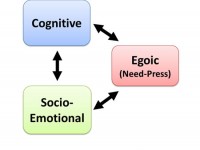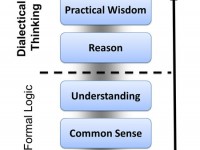This text highlights the main benefits of integrating research in adult development into executive coaching practice. Reading the text from a coaching point of view will be a first step to the practice of developmental coaching, with a focus on working withhigher level executives. The text refers to CDF, the Constructive Development Framework. Introduction to Developmental Coaching for Executives Read More...
Tag: Cognitive Dimension
Invitation for the workshop “Rewiring Team Dynamics: Building Collective Intelligence”
Dear IDM Friend, May I invite you to attend the International Workshop on Rewiring Team Dynamics: Building Collective Intelligence in Mechelen (Belgium) from June 17th - June 19th . The way we work is changing. So is the nature of teamwork at all levels in the organization changing. The age of ‘command & control’ in teamwork is shifting towards a ‘collaborate & communicate’ approach. We all know that innovation and creativity mainly takes place in a collaborative context. Nevertheless teamwork remains for a lot of organizations a confounding mystery. Diversity is rarely used in the most effective way. Most of the team’s potential remains unlocked. Otto Laske and myself have developed an approach that reveals the principles by which we can unlock the potential of colleagues, that can release the creative potential of your organization. Building upon the Constructive Developmental Framework we have developed a set of tools both practical yet deep in wisdom. The Workshop ‘Rewiring Team Dynamics’ helps you practice ways by which to create collective intelligence and reveals the learnable art of thinking productively together. The workshop is based on a system of thought forms that help team members unravel their own resources for thinking in a... Read More...
Short Characterization of the CDF-Based Coaching Methodology
This short article describes what makes CDF-based coaching unique and makes it different from other coaching approaches. The CDF-based coach training method enriches approaches based on theories of adult learning by insights and practices derived from theories of adult development over the lifespan (1975-1995). CDF further enriches theories of adult development by insights derived from Critical Theory elaborated at the Frankfurt School between 1945 and 1975. Researchers of adult learning and development have only just begun to talk to each other, so that a synthesis of the two lies in the more or less distant future. The main result of including in coaching techniques of Critical Theory (Adorno) is that the emphasis of CDF-training is on the coach, not the client, in particular the coach as a “critical, deep thinker” who can guide the client’s adult development, fully aware of the client’s present developmental profile. Learning and development are seen in CDF as entirely different. “Learning” is accumulation of knowledge and experience over time (measured by horizontal snapshots at a particular time point), while “development” is a discontinuous deepening of meaning making and thinking across individuals’ entire lifespan (measured longitudinally, across time, through structured interview). Whereas adult learning approaches are... Read More...
Introduction to the three CDF Dimensions (Self-Study)
This course introduces students to a widely acclaimed, holistic perspective on both individuals and teams. It is an overview course focused the three perspectives in which CDF-users view clients: the social-emotional, cognitive, and psychological one. Insight into these dimensions stems from decades of validated research since the 1970s but has not been widely taught in a unified fashion. In the course, emphasis is placed as well on the interrelationships between the three dimensions since they closely interact in coaching as well as consulting. Based on this course, students become eligible for all other CDF courses. Read more Read More...
Cognitive Development Toward Dialectic
The essence of the cognitive dimension of CDF has to do with how adults differ in making cognitive sense (rather than meaning) of their life and work experiences, thus with what they do and do not understand about the real world. These differences go far beyond “what is in the head” since how people construct the world conceptually precedes their actions in the world, and thus equally manifests in their activities, planning, goal setting, decision making, and execution of leadership functions. In most general terms, students learn to switch from “what” to think to “how” to think, thereby gaining fluidity of thinking based on an awareness of their present way of thinking that makes some things “unthinkable” to them. In this life-changing course, students gain insight not only into the theory of cognitive development and the development of dialectic, but also begin to apply dialectical thought forms in text analysis, in cohort discussion, and in coaching interventions with individuals and teams. Read more Read More...
Case Study I (b): Practicum in Dialectical Thinking and Listening
This course leads participants from merely talking about dialectical thought forms to interactively eliciting them through a semi-structured interview and evaluating their use based on relevant fragments from a client interview. The program offers students the opportunity to show themselves and others that they have not only mastered “developmental theory”, but also know how to use it in practice. For the student, writing a the case study involves: Completing a 1-hr semi-structured cognitive interview following the protocol of the “Three Houses” (possibly in a modified form) Transcribing the interview(s) into English for discussion in the study cohort Selecting 30 structurally relevant fragments of the interview conducted Based on these fragments, presenting in class a coding sheet describing how the client’s cognitive profile is to be evaluated, for discussion in the study cohort At the end of the course, gathering and submitting all pertinent materials making up the case study to the Director of Education for personal feedback on scoring and focusing of client feedback. Read more Read More...

